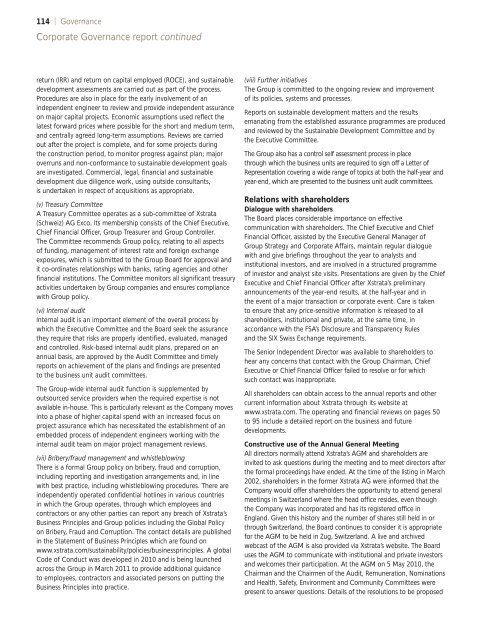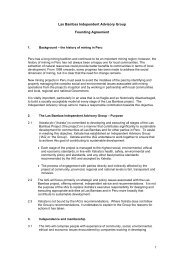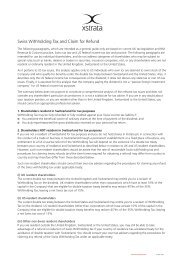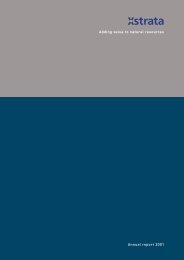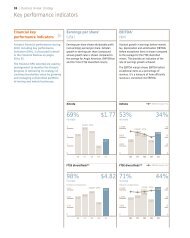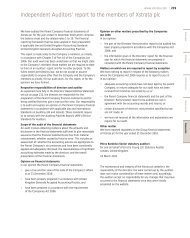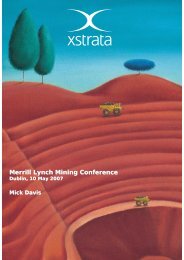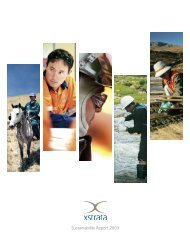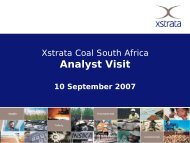Governance - Xstrata
Governance - Xstrata
Governance - Xstrata
Create successful ePaper yourself
Turn your PDF publications into a flip-book with our unique Google optimized e-Paper software.
114 | <strong>Governance</strong><br />
Corporate <strong>Governance</strong> report continued<br />
return (IRR) and return on capital employed (ROCE), and sustainable<br />
development assessments are carried out as part of the process.<br />
Procedures are also in place for the early involvement of an<br />
independent engineer to review and provide independent assurance<br />
on major capital projects. Economic assumptions used reflect the<br />
latest forward prices where possible for the short and medium term,<br />
and centrally agreed long-term assumptions. Reviews are carried<br />
out after the project is complete, and for some projects during<br />
the construction period, to monitor progress against plan; major<br />
overruns and non-conformance to sustainable development goals<br />
are investigated. Commercial, legal, financial and sustainable<br />
development due diligence work, using outside consultants,<br />
is undertaken in respect of acquisitions as appropriate.<br />
(v) Treasury Committee<br />
A Treasury Committee operates as a sub-committee of <strong>Xstrata</strong><br />
(Schweiz) AG Exco. Its membership consists of the Chief Executive,<br />
Chief Financial Officer, Group Treasurer and Group Controller.<br />
The Committee recommends Group policy, relating to all aspects<br />
of funding, management of interest rate and foreign exchange<br />
exposures, which is submitted to the Group Board for approval and<br />
it co-ordinates relationships with banks, rating agencies and other<br />
financial institutions. The Committee monitors all significant treasury<br />
activities undertaken by Group companies and ensures compliance<br />
with Group policy.<br />
(vi) Internal audit<br />
Internal audit is an important element of the overall process by<br />
which the Executive Committee and the Board seek the assurance<br />
they require that risks are properly identified, evaluated, managed<br />
and controlled. Risk-based internal audit plans, prepared on an<br />
annual basis, are approved by the Audit Committee and timely<br />
reports on achievement of the plans and findings are presented<br />
to the business unit audit committees.<br />
The Group-wide internal audit function is supplemented by<br />
outsourced service providers when the required expertise is not<br />
available in-house. This is particularly relevant as the Company moves<br />
into a phase of higher capital spend with an increased focus on<br />
project assurance which has necessitated the establishment of an<br />
embedded process of independent engineers working with the<br />
internal audit team on major project management reviews.<br />
(vii) Bribery/fraud management and whistleblowing<br />
There is a formal Group policy on bribery, fraud and corruption,<br />
including reporting and investigation arrangements and, in line<br />
with best practice, including whistleblowing procedures. There are<br />
independently operated confidential hotlines in various countries<br />
in which the Group operates, through which employees and<br />
contractors or any other parties can report any breach of <strong>Xstrata</strong>’s<br />
Business Principles and Group policies including the Global Policy<br />
on Bribery, Fraud and Corruption. The contact details are published<br />
in the Statement of Business Principles which are found on<br />
www.xstrata.com/sustainability/policies/businessprinciples. A global<br />
Code of Conduct was developed in 2010 and is being launched<br />
across the Group in March 2011 to provide additional guidance<br />
to employees, contractors and associated persons on putting the<br />
Business Principles into practice.<br />
(viii) Further initiatives<br />
The Group is committed to the ongoing review and improvement<br />
of its policies, systems and processes.<br />
Reports on sustainable development matters and the results<br />
emanating from the established assurance programmes are produced<br />
and reviewed by the Sustainable Development Committee and by<br />
the Executive Committee.<br />
The Group also has a control self assessment process in place<br />
through which the business units are required to sign off a Letter of<br />
Representation covering a wide range of topics at both the half-year and<br />
year-end, which are presented to the business unit audit committees.<br />
Relations with shareholders<br />
Dialogue with shareholders<br />
The Board places considerable importance on effective<br />
communication with shareholders. The Chief Executive and Chief<br />
Financial Officer, assisted by the Executive General Manager of<br />
Group Strategy and Corporate Affairs, maintain regular dialogue<br />
with and give briefings throughout the year to analysts and<br />
institutional investors, and are involved in a structured programme<br />
of investor and analyst site visits. Presentations are given by the Chief<br />
Executive and Chief Financial Officer after <strong>Xstrata</strong>’s preliminary<br />
announcements of the year-end results, at the half-year and in<br />
the event of a major transaction or corporate event. Care is taken<br />
to ensure that any price-sensitive information is released to all<br />
shareholders, institutional and private, at the same time, in<br />
accordance with the FSA’s Disclosure and Transparency Rules<br />
and the SIX Swiss Exchange requirements.<br />
The Senior Independent Director was available to shareholders to<br />
hear any concerns that contact with the Group Chairman, Chief<br />
Executive or Chief Financial Officer failed to resolve or for which<br />
such contact was inappropriate.<br />
All shareholders can obtain access to the annual reports and other<br />
current information about <strong>Xstrata</strong> through its website at<br />
www.xstrata.com. The operating and financial reviews on pages 50<br />
to 95 include a detailed report on the business and future<br />
developments.<br />
Constructive use of the Annual General Meeting<br />
All directors normally attend <strong>Xstrata</strong>’s AGM and shareholders are<br />
invited to ask questions during the meeting and to meet directors after<br />
the formal proceedings have ended. At the time of the listing in March<br />
2002, shareholders in the former <strong>Xstrata</strong> AG were informed that the<br />
Company would offer shareholders the opportunity to attend general<br />
meetings in Switzerland where the head office resides, even though<br />
the Company was incorporated and has its registered office in<br />
England. Given this history and the number of shares still held in or<br />
through Switzerland, the Board continues to consider it is appropriate<br />
for the AGM to be held in Zug, Switzerland. A live and archived<br />
webcast of the AGM is also provided via <strong>Xstrata</strong>’s website. The Board<br />
uses the AGM to communicate with institutional and private investors<br />
and welcomes their participation. At the AGM on 5 May 2010, the<br />
Chairman and the Chairmen of the Audit, Remuneration, Nominations<br />
and Health, Safety, Environment and Community Committees were<br />
present to answer questions. Details of the resolutions to be proposed


